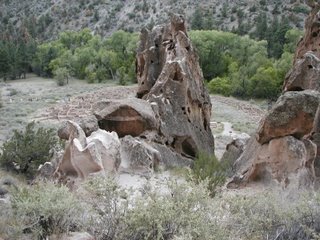Americans as Anasazi?

I have finally found the antidote to James Howard Kuntsler (refer to posts back in August of last year).
Kunstler, who I used to really like for his books on urbanism (Geography of Nowhere, etc.), published a book (The Long Emergency) last year that basically said: "everyone is going to die, freezing in the dark, and there's nothing anyone can do about it." Civilization, according to Kunstler, is fated to destroy itself.
I don't have an argument with Kunstler's ideas about how foolish we all currently our, with our addiction to oil (do I dare use that term now that GWB has co-opted it?), etc., but I do think he takes the absolute worst scenario and runs too far with it.
Yes, our society--the global one, not just America--is headed for a period of reckoning, and there are many disturbing trends that need to be reversed, and we need to summon up the willpower to do that. But Kunstler says anything we try is doomed to fail.
So what's the corrective to this dark view? A book that was published in hardcover a few months before Kunstler's, and that is now in paperback: Collapse, by Jared Diamond. Diamond, a professor at UCLA, has been on the bestseller lists for several years now with his Guns, Germs and Steel (1998; paper 1999). I read that book way back when I still worked at the Tattered Cover, and it affected my thinking about human society in a variety of ways. GS&S was about how a variety of environmental factors affected different groups of humans in different ways, and why some societies developed the wheel and others didn't. That book isn't "environmental determinism," a simplistic and under-developed idea that says "environment is everything," but rather a sophisticated examination of human history that encomasses a wide variety of perspectives.
Collapse continues Diamond's examination of human societies, and in this book he explores the question of why some human societies collapse, and others don't. More importantly, he also surveys our modern world to see if there are signs of collapse right now--signs that are similar to factors that caused past societies to disappear. He looks at Easter Island, several other Pacific island societies, and (in a somewhat over-long look) Norse Greenland. He also looks at past societies that faced similar difficulties to the ones that collapsed but didn't disappear--Tokugawa Japan, for example--and asks why they succeeded.
Then he turns to modern societies that have collapsed (Rwanda, Haiti) and others that could collapse if current trends are not reversed (China, Australia). Finally, he asks: what can be done? He puts together a list of common "one-liners" that people (conservatives) use as reasons to "don't worry, be happy." Arguments like "technology will save us," "the Earth can support population growth indefinitely through the Green Revolution," and so on. And he destroys them.
Finally, he says his outlook is "cautiously optimistic," because we CAN change. I like that, and not just because he's not as pessimistic as James Howard Kunstler. I like it because it's up to all of us, and because it recognizes that we all make a difference.
Now turn off some lights and figure out a way to re-use something you'd normally throw away--and go out and borrow a copy of Collapse from your local library.

